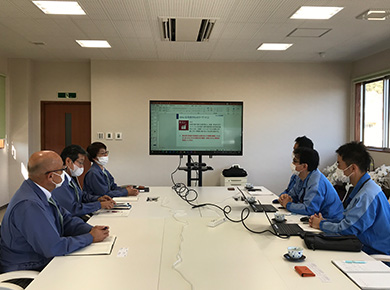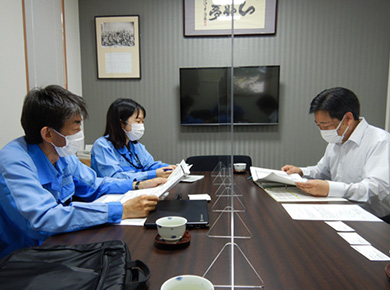CSR Procurement
Policy
It is the policy of the Asahi Kasei Group to consider suppliers as important partners and to treat them with sincerity.
Our Mission and Vision for procurement are an expression of our ideals to apply in daily activities as we work to uphold our Procurement Policy and promote procurement practices with an emphasis on CSR.
Accordingly, we consider suppliers from an environmental aspect, including energy use and climate change, biodiversity, reducing pollution and waste, and efficient use of resources, and also from a social perspective, including discrimination, equal opportunity, freedom of association, and compliance with local laws concerning working hours and wages.
A relationship of mutual trust with our suppliers is fostered through fair and principled purchasing practices based on regulatory compliance and respect for the environment and human rights.
![Procurement Principles [Mission] Contributing to the Asahi Kasei Group's value creation and sustainable growth through reliable procurement and logistics [Vision] Building a strong and a sustainable supply chain for the Asahi Kasei Group [Basic Policy] 1. Compliance, We uphold all laws relevant to purchasing transactions as well as the Asahi Kasei Group’s internal regulations. 2. Fairness and impartiality, Selection of bids and conclusion of contracts are performed in a fair and impartial manner. 3. Open door principle, We provide fair opportunities to any potential supplier, both domestic and overseas. 4. CSR-focused procurement, We perform purchasing in close coordination with our group-wide activities for CSR. 5. Partnership, We strive to deepen mutual understanding and build relationships of trust with suppliers.](/sustainability/social/scm/images/index-img-01.png) The Asahi Kasei Group Procurement Principles
The Asahi Kasei Group Procurement Principles
Supplier Code of Conduct
We conduct business activities in various countries and regions around the world, and are expected to address social issues to achieve a sustainable society, including measures against climate change and respect for human rights, not only within the Asahi Kasei Group but throughout the entire supply chain as well.
For this reason, we formulate our Supplier Guidelines in 2021 as a tool for promoting CSR procurement based notably on our Procurement Policy, our Sustainability Policy, our Human Rights Policy, and our Quality Policy. In fiscal 2023, we shared the latest trends with the procurement managers of Asahi Kasei Homes, Asahi Kasei Medical, Asahi Kasei Microdevices and other companies and organized meeting feedback sessions on the direction of Group-wide activities and the content of each item. Results of the discussions were newly summarized in the Asahi Kasei Group’s Supplier Code of Conduct. To ensure that our suppliers understand and agree with our policies, we plan to disclose them on our website along with our Procurement Policy, ask suppliers to sign, and submit an agreement form. We will also monitor compliance through CSR assessments of our suppliers and cooperate to make improvements.
- Note:The Code of Conduct was revised in September 2024.
Management Framework
Corporate Procurement & Logistics is responsible for the Asahi Kasei Group Procurement Policy, and the department cooperates with the Sustainability Strategy Planning Department to familiarize Group Companies with the content.
In fiscal 2022, we clearly defined the department responsible for sustainability promotion within Corporate Procurement & Logistics to strengthen CSR procurement activities in procurement and logistics functions. In addition, in light of recent changes in the procurement environment, we are promoting activities with the following system regarding supply chain management.
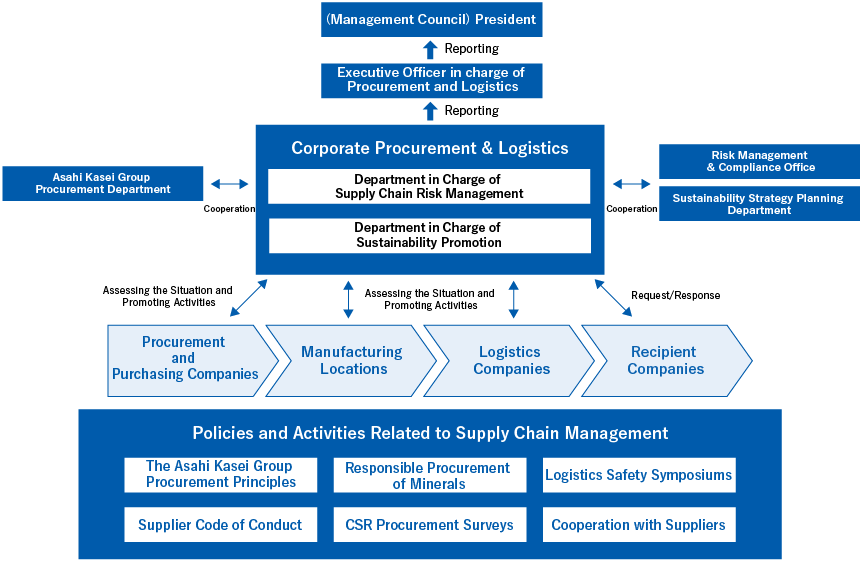 Supply Chain Management Framework
Supply Chain Management Framework
Participation in the Declaration for Partnership Building system
In 2022, Asahi Kasei endorsed the Declaration for Partnership Building in support of the Council for Promoting Partnership Building to Open Up the Future, promoted by the Cabinet Office, the Small and Medium Enterprise Agency, and other organizations.
In our declaration, we have specified the following:
- We agree with the purpose of the White Logistics Movement, and based on our voluntary action declaration, we are working to improve logistics based on mutual understanding and cooperation with suppliers, logistics operators, and other related parties.
- We have established the Supplier Code of Conduct in an effort to promote understanding and initiatives among our suppliers in areas such as human rights, labor, health and safety, the environment, and ethics.
- We continue to provide in-house training on the Act against Delay in Payment of Subcontract Proceeds, etc. to Subcontractors.
We will continue to aim to build new partnerships by promoting collaboration, co-existence and co-prosperity with our business partners in the supply chain.
In addition to the Asahi Kasei Group, Asahi Kasei Homes, Asahi Kasei Pharma, and Asahi Kasei Medical have also announced their endorsement of the Declaration for Partnership Building.

Raising awareness of Procurement Policy and Supplier Code of Conduct
To ensure that suppliers are familiar with our Procurement Policy and Supplier Code of Conduct, we strive to raise awareness by disclosing them on the website and asking them to complete our CSR procurement questionnaires. In fiscal 2023, we held an online briefing session for approximately 200 domestic suppliers eligible to answer the CSR procurement questionnaire at the time of implementation, during which we also explained our Procurement Policy and Supplier Code of Conduct.
Evaluation of CSR at suppliers
The Asahi Kasei Group is working with its suppliers to promote CSR procurement with the aim of constructing a sustainable supply chain.
We conduct supplier surveys as part of our CSR procurement from two perspectives, 1) evaluation at the commencement of new transactions and 2) ongoing evaluation of suppliers.
Approach to new suppliers
When we start doing business with a new supplier, we evaluate, including from a CSR perspective, whether or not we can do business with them after conducting a preliminary screening based on our Procurement Policy.
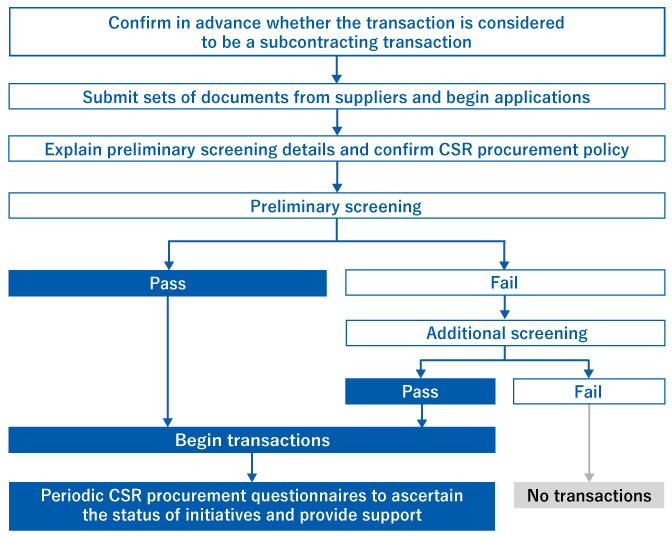 Process flow for new suppliers
Process flow for new suppliers
If significant problems are detected during the preliminary screening, we encourage suppliers to make improvements as soon as possible. If subsequent screenings do not confirm that the issues have not been rectified, business dealings may not be possible.
Approach to ongoing suppliers
To ensure that our suppliers continue to carry out their business activities aware of their corporate social responsibilities, we conduct and disclose the results of CSR procurement questionnaires annually using the latest version of the UN Global Compact's CSR Procurement Self-Assessment Tool Set. In this way, we are improving the level of CSR by cooperating with our suppliers, and avoiding environmental and social risks in the supply chain.
Question categories
- 1. Corporate governance related to CSR
- 2. Human rights
- 3. Labor
- 4. Environment
- 5. Fair corporate activities (ethics and compliance)
- 6. Product safety and quality assurance
- 7. Information security
- 8. Supply chain
- 9. Harmony with the local community
FY2023 CSR Procurement Questionnaire
In fiscal 2023, we asked 222 of our major suppliers of raw materials to complete a questionnaire, and received responses from 215 companies. The suppliers that responded to the questionnaire account for approximately the top 80% of contracts by value among raw material suppliers that do business with Corporate Procurement & Logistics.
We also started a new questionnaire for our logistics suppliers, asking 20 companies to complete the survey, and we receive responses from all of them. The suppliers that responded to the questionnaire account for approximately the top 80% of contracts by value among logistics suppliers that do business with Corporate Procurement & Logistics.
Number of responses and results to our CSR Procurement Questionnaire
| Rating | Raw material suppliers | Material suppliers | Logistics suppliers | |||
|---|---|---|---|---|---|---|
| FY2021 | FY2023 | FY2020 | FY2022 | FY2023 | ||
| A | 79(78%) | 164(76%) | 77(41%) | 119(56%) | 13(65%) | |
| B | 17(17%) | 40(19%) | 67(36%) | 60(28%) | 4(20%) | |
| C | 3(3%) | 10(4%) | 31(17%) | 28(13%) | 3(15%) | |
| D | 2(2%) | 1(1%) | 12(6%) | 7(3%) | 0(0%) | |
| Total | 101 | 215 | 187 | 214 | 20 | |
By category, raw material suppliers’ results for Labor, Fair Corporate Activities, Product Safety and Quality Assurance, and Information Security were high, while results for Supply Chain and Harmony with the Local Community were relatively low. For logistics suppliers, results for Labor, Fair Corporate Activities, Product Safety and Quality Assurance, and Information Security were high, while results for the Environment, Supply Chain, and Harmony with the Local Community were relatively low.
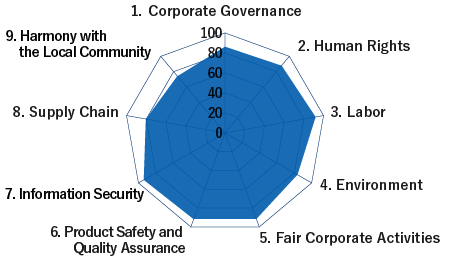 Raw materials
Raw materials
Results of CSR Procurement Questionnaire (FY2023)-
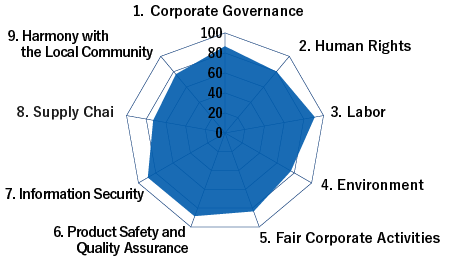 Logistics
Logistics
Results of CSR Procurement Questionnaire (FY2023)
The Asahi Kasei Group sends out feedback sheets to those suppliers who have responded to our CSR Procurement Questionnaire. In addition, for suppliers that received a C or D rating, we visit them or conduct online interviews to confirm the situation and offer support for improvements.
If significant problems are detected as a result of the talks, we exchange ideas with the supplier and encourage them to make improvements as soon as possible. If follow-up screenings do not confirm that the issues have been rectified, we will consider halting or reviewing business dealings.
In addition to the above follow-up, we are conducting interviews with suppliers who have significantly improved their evaluation compared to the previous questionnaire, and hearing about best practices in CSR promotion activities.
Support for improvement of the evaluation of the CSR Procurement Questionnaire for suppliers
In fiscal 2023, we conducted interviews with 33 of the 35 suppliers who received a C or D rating in the fiscal 2022 questionnaire (material suppliers). However, in fiscal 2023, no significant issues were discovered with any of our suppliers. In addition, we conducted interviews with 7 suppliers, who had significantly improved their evaluation compared to the fiscal 2020 questionnaire, and heard about best practices in CSR promotion activities.
For suppliers ranked C and D in the fiscal 2023 questionnaire (11 raw material suppliers and 3 logistics suppliers), we individually evaluated and analyzed all responses and risks to the supply chain, and are communicating with them as needed regarding improvements based on our Group’s feedback.
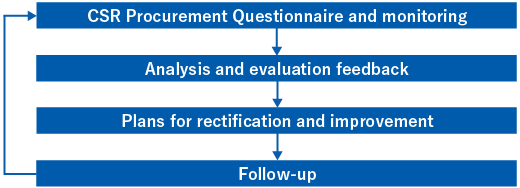 Process flow for ongoing suppliers
Process flow for ongoing suppliers
Supplier environmental certification
In the CSR procurement questionnaire, we also surveyed the status of environmental management systems by acquiring a third-party certification system such as the international standard ISO 14001. Approximately 80% of our major raw material suppliers (out of 215 companies) in the fiscal 2023 questionnaire and approximately 70% of our major material suppliers (out of 214 companies) in the fiscal 2022 questionnaire have systems and mechanisms in place to promote environmental protection.
Response to conflict minerals
It is a global trend that more and more countries are banning the procurement of minerals from inhumane armed groups, particularly in the Democratic Republic of the Congo and neighboring countries. In the US, this is required by the Dodd-Frank Act of 2010.
The Asahi Kasei Group considers conflict minerals to be a serious issue, and our policy is to ensure transparency in our supply chains and to procure minerals responsibly. We do not obtain, procure, or utilize minerals from armed groups, and avoid supporting conflict and inhumane activities.
Initiatives in fiscal year 2023
In addition to CSR surveys, individual surveys on conflict minerals are conducted on a regular basis to prevent complicity in negative human rights impacts due to their use. In fiscal 2023, we sent a request to our suppliers to investigate all of the 10 raw materials we procure to see if any fall under conflict minerals (tantalum, tin, tungsten, gold, cobalt, and mica). As a result, we were able to confirm that all of the raw materials we use are not conflict minerals. The CMRT (Conflict Minerals Report) and EMRT (Extended Minerals Report) published by RMI (Responsible Minerals Initiative) are used to conduct these surveys.
Contribution to sustainable logistics
The Asahi Kasei Group, primarily from the position of a cargo owner, is working to contribute to sustainable logistics. In response to a severe shortage of truck drivers in Japan, we announced in 2019 our declaration of voluntary activities as part of the White Logistics Movement promoted by the Ministry of Land, Infrastructure, Transport and Tourism, the Ministry of Economy, Trade and Industry, and the Ministry of Agriculture, Forestry, and Fisheries. We work on initiatives toward enhancing the productivity and efficiency of the trucking industry while improving the working conditions for drivers.
To cope with the “2024 problem,” in which limits on overtime hours have been applied to truck drivers since April 2024, raising the difficulty of securing transportation, especially long-distance transportation, we are promoting measures such as modal shifts in cooperation with logistics companies.
In December 2023, the Chemicals Working Group established within the “Physical Internet Realization Council” led by the Ministry of Economy, Trade and Industry and the Ministry of Land, Infrastructure, Transport and Tourism, in which we also participate, announced a voluntary action plan to optimize logistics and improve productivity. This voluntary action plan forms the basis of our promotion efforts such as the reform of business practices in cooperation with our customers and logistics providers.
- Asahi Kasei Corporation “White Logistics Movement” Declaration of voluntary activities
- Physical Internet Realization Council
Chemicals Working Group
Plan of voluntary initiatives for optimization and productivity improvement of logistics related to chemicals
Training for Employees
To promote sustainability activities, Corporate Procurement & Logistics has been providing ongoing training to employees in procurement-related departments about sustainability in general in cooperation with the Sustainability Strategy Planning Department and the procurement departments at subsidiaries and affiliates. The details of training activities in fiscal 2023 are as follows:
| Training | Content | Summary of Training |
|---|---|---|
| Sustainability Training (1) | General knowledge regarding sustainability and Asahi Kasei's sustainability(Elementary) | Target: Personnel responsible for materials, personnel responsible for logistics Participants: 132 |
| Sustainability Training (2) | General knowledge regarding sustainability and Asahi Kasei's sustainability(Intermediate) | Target: Personnel responsible for raw materials, personnel responsible for materials Participants: 57 |
| Procurement Personnel Training | Supply chain risk management | Target: Personnel responsible for raw materials, personnel responsible for materials Participants: 174 |
Initiatives in fiscal year 2023
In addition to the aforementioned educational activities, we have started the “Sustainability Ambassador System” in fiscal 2023, consisting of certain personnel in charge of materials and logistics, in an effort to improve sustainability literacy within departments.
More specifically, in the materials area, we held “discussions for upgrading follow-up activities for CSR procurement questionnaires,” “study session on industry trends related to sustainability,” and “discussions for strengthening supplier engagement activities.” In the logistics area, we conducted “study sessions on low-carbon transportation modes by suppliers,” “study sessions on GHG emissions calculation methods,” and “discussion on how to promote CSR activities.”
Communication with suppliers
Safety seminars are periodically held at our principal production sites to discuss accident prevention and exchange information with suppliers.
We also actively engage in close communication with our suppliers by actually visiting them, or having them visit our offices, to inform them about sustainability-related trends and promotional activities, as well as to exchange views. We will continue to enhance mutual communication, improve safety, and promote sustainable procurement.
The Asahi Kasei Group compliance hotline also accepts reports and inquiries from suppliers.

